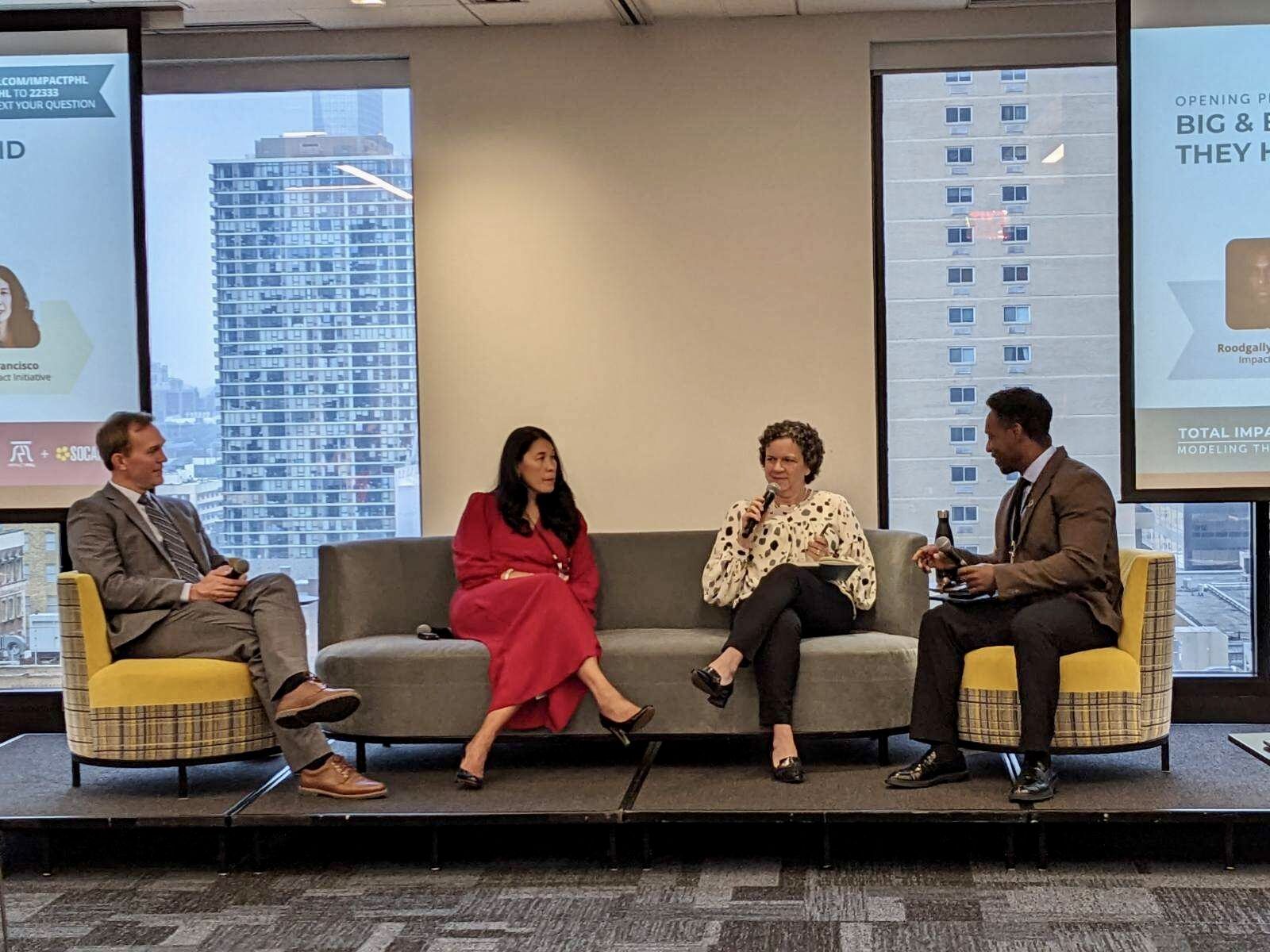Greetings, Agents of Impact!
Impact investing straddles the tectonic plates of public purpose and private capital, so expect seismic rumblings as systems shift. A case in point is the debate over financing for climate action on the scale called for by “the Green New Deal” (see No. 1, below). Public or private is not the right question; how to blend them is. The same complexity bedevils Opportunity Zones (No. 3), which are both a tax break for the rich and a new source of capital for low-income neighborhoods. Likewise, holding private equity giants like KKR and TPG accountable for social and environmental impact (Nos. 2 and 6) will take persistence and innovation. “Winners Take All” author Anand Giridharadas called for “a moratorium on impact investing, until finance unwinds its complicity.”* (No. 8). That could be a long wait. Better to embrace the complexity, push forward and get on with optimizing both policy and finance for positive impact (No. 6).
– David Bank, editor
*An earlier version of this Brief misquoted Giridharadas as saying …”until finance unwinds its complexity.” We regret the error.
Featured: The Brief’s Big 8
- Financing the Green New Deal (podcast). U.S. senators may get to vote on an ambitious manifesto, promoted by newly elected Rep. Alexandria Ocasio-Cortez. The “Green New Deal” pledges the U.S. to “net-zero” greenhouse gas emissions by 2030 and to use that mobilization to drive good jobs and quality health care for all. The roundtable regulars in the latest Returns on Investment podcast tried to force ImpactAlpha’s David Bank to choose between private investment or government funding. All of the above, he said. The proposal’s emphasis on public funding “undersells that there is going to be massive private investment as well,” Bank said. Elements of the financing mechanisms in the proposal have been built by the impact investing industry in recent decades. There is no need to “wait for Washington” to invest, roundtable regular Imogen Rose-Smith agreed. The legislation’s emphasis on public accountability is key. Read on and listen in.2. What’s the impact of KKR Global Impact’s investment in an Indian waste-management venture? The new detail in this week’s close of KKR’s $510 million deal for a majority stake in Indian municipal waste processor Ramky Enviro Engineers: KKR’s (planned) $1 billion Global Impact Fund got a piece of the investment, which was led by KKR’s $9 billion Asia Fund III. In a separate deal last year, TPG Growth’s $2 billion Rise Fund was part of a trio of TPG funds that together invested $1 billion in Chinese internet giant Baidu’s spinout of its financial services unit. The entrance into impact investing of multifarious private-equity firms like KKR, TPG and Bain Capital brings up a long-simmering question: what difference does impact capital make in investments that purely commercial investors would have made anyway? KKR Global Impact’s Ken Mehlman told ImpactAlpha the impact fund would follow the Asia Fund’s ESG (for environmental, social and governance) approach. “This is obviously something we do across KKR,” he said. Inside the strategy.3. Bobby Turner’s contrarian take on Opportunity Zones. The former hedge fund partner turned impact investor is an outspoken contrarian on the Opportunity Zones legislation included in the 2017 U.S. tax bill. It’s not that low-income, inner-city neighborhoods don’t need the infusion of capital, Turner writes in a guest post on ImpactAlpha. It’s that the legislation is unlikely to overcome the main reason institutional capital has stayed away from disadvantaged communities: the perception of risk. Reducing those risks requires humility, empathy and other skills that most outside investors lack. Successful investments will reflect community priorities of education, healthcare and safety, not luxury apartments or destination retail. “Fulfilling the spirit of the Opportunity Zone ideal means pulling people up, not pushing people out.” Turner’s take.
4. Agent of Impact: Rodrigo Villar, New Ventures Mexico. Rodrigo Villar is building a market in Mexico and Latin America around the thesis that the path to competitive returns runs through social ventures. As head of New Ventures Mexico, he has stocked the deal pipeline with support for more than 800 enterprises. As a founder of Adobe Capital, New Ventures’ venture capital arm, he’s helped mobilize more than $41 million across two impact funds. Villar represents Mexico among 17 countries on the Global Steering Group for Impact Investing. And with next week’s ninth Foro Latinoamericano de inversión de impacto in Mérida, Mexico, Villar is bringing together the region’s other Agents of Impact (ImpactAlpha is a media sponsor). Funds targeting basic services for Mexico’s low- and emerging-middle classes “could provide equal or better returns than other funds,” he says. “We wanted to prove that this kind of mechanism in developing countries is a good strategy for investors.” Follow ImpactAlpha on Instagram.
- Catch up. “For Adobe Capital, competitive returns in Mexico run through social ventures”
- Weekly roundup. Follow the talent with ImpactAlpha’s weekly report on career moves, job openings, events and opportunities.
- Deals of the week. Drink from the deal firehose all week long on ImpactAlpha.com. A few that stood out:
- Dealflow: FLII edition. Blue Like an Orange finances Cabify to boost safety in ride hailing in Latin America… Acumen’s Latin America fund backs Peruvian skills startup Crehana… Agora Partnerships graduates 30 Latam and Caribbean startups targeting the Global Goals… Adianta raises $2.2 million to expand access to working capital in Brazil.
- African entrepreneurship. Zimbabwe’s Strive Masiyiwa launches $100 million loan fund for rural entrepreneurs… I&P raises €75 million for African startups targeting the Global Goals… Lion Pride Agility Fund launches to invest in South African impact ventures.
- Micro-lending. Tugende secures $5 million loan from PG Impact Investments for lease-to-own motorbike taxis… Svasti Microfinance raises $4.8 million to extend financial services to low-income Indians.
- Underwriting—and optimizing—for impact on Agents of Impact Call No. 7. Nearly 200 ImpactAlpha subscribers tuned into ImpactAlpha’s Agents of Impact Call No. 7 to learn how to drive impact through data-driven management. Y Analytics’ Maryanne Hancock said that tools developed by TPG Growth’s Rise Fund will help investors push impact throughout the investment life-cycle. Impact Management Project’s Clara Barby stressed ongoing measurement and periodic recalibration so “you know whether what’s happening is bad, good, or as good as it could be. And then you improve.” Wharton Social Impact’s Maoz (Michael) Brown and the GIIN’s Kelly McCarthy distinguished raw data- and evidence-based decision-making. The Call turned up excellent resources for underwriting and optimizing impact. We rounded them up. Get management-smart.7. Building local startup ecosystems that work for entrepreneurs of color. Some cities are trying to attract historically overlooked entrepreneurs of color. In others, black and Latino entrepreneurs are building their own business-support structures. Living Cities is pursuing racial equity by investing in local ecosystems that work for underserved entrepreneurs. In the latest post in the Investing in Racial Equity series, Living Cities’ reflects on lessons learned: that trust is an asset in New Orleans; that crowdfunding enables people of color to invest in diverse owners in San Francisco; that anchor institutions in Baltimore ensure that low-income communities benefit from new developments. Read, reflect.
- Catch up with the Investing in Racial Equity series.
- Returns on inclusion dealflow: JPMorgan’s Entrepreneurs of Color Fund expands to Washington, D.C….New York’s Harlem Capital backs Atlanta-based Sudu to boost minority-run trucking businesses.
- The Economist stages a debate on the future of impact investing. The motion: This house believes that impact investing will turn out to be the most profitable way to invest. The Economist’s third New York forum kicked off with an Oxford-style debate. Debaters stood on opposite sides of the stage, but all seemed to argue in favor of the motion. Beeck Center’s Lisa Hall cited the diversity of talent attracted to impact investing (Ellevest’s Sallie Krawcheck concurred). Ronald Gilson, of both Stanford and Columbia, said fund performance must be tied to impact outcomes. IGNIA’s Michael Chu called for clarity around the impact of different investment types. Goldman Sachs John Goldstein redefined “profits” to help the pro- side win. Later, author Anand Giridharadas called for a crack-down on billionaire tax evasion, better collective bargaining for the working class, and an end to class segregation in the U.S. ImpactAlpha caught the highlights from the day. Catch up.
— February 15, 2019.











